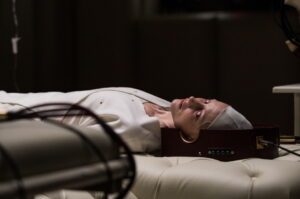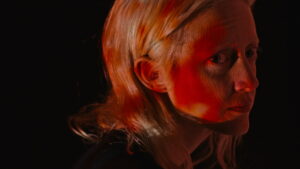The second feature from innovative writer/director Brandon Cronenberg, Possessor (released online Fri 27 Nov) is a potent and disturbing sci-fi thriller about a corporate agent named Vos (Andrea Riseborough) who uses brain-implant technology to inhabit other people’s bodies, driving them to commit assassinations for the benefit of the company. When something goes wrong on a routine job, Vos finds herself trapped inside a man whose identity threatens to obliterate her own.
Dazzling with its impeccable sound design and visual aesthetic, non-CGI generated prosthetics and ambitious world building, the film remains grounded in (an alternate) reality with the haunting lead performances of Riseborough, Christopher Abbott, and Jennifer Jason Leigh. Offering a unique exploration of the innate conflict between self-interest, family and responsibility and the transcendence of gender, Possessor is a film that deals very eloquently and movingly with human fragility. It also possesses an astute political and philosophical edge in its analysis of how big corporations are able to infiltrate and affect our personal lives.
Jason Wood: I was a huge fan of Anti-Viral (2012), which was similarly ambitious and audacious. How would you compare and contrast the experiences of directing your first and second features? Did you feel you had more knowledge and experience in terms of achieving your ambition second time around?
Brandon Cronenberg: You definitely learn a lot every time you make a film and the first time making a feature film is a huge learning experience generally. There isn’t anything specific I can point to or anything specific that I’ve learnt. But I do think you have a better sense of how to track a narrative over such a long period of time in a scene-by-scene way. And hopefully I’ve learnt a slightly broader directorial toolset.
JW: I have read that the idea for Possessor came from a very personal place on your life where things were changing very quickly. How did you want to channel that and why did sci-fi feel like the right genre to do that in?
BC: I think sci-fi is generally a great genre to explore any problems a person might be dealing with because it’s about removing yourself from the real-world and looking at it in a different way. A caricature of what’s happening in society or in your life.
JW: For me, and for all the horror on show, the most terrifying aspect of Possessor is the corporate aspect. In an era of the invasion of the age of piracy this feels incredibly prescient. Was this also a territory and terrain that you wanted to explore?
BC: Yes, very much so. The Snowden leaks happened while I was writing the film and I was feeling very depressed about the privacy of technology. So that was very much on my mind while I was writing the film.
JW: I am loath to ask this because I found your film to be brilliantly original but in terms of the notion of the body and transposition o another body as a means of exploring identity and detachment I wondered if you allowed yourself all to draw on other films or texts? I found myself often thinking of Seconds (1966), a film that is sacred to me and, like Possessor feels both of and ahead of its time.
BC: I did actually watch Seconds during pre-production. I also watched The Face of Another (1966), the Hiroshi Teshigahara film. But those weren’t really the primary influences. I didn’t watch them while writing but I felt it was important to watch films that have been made in a similar vein.
JW: The film plays with notions of gender. Is it true that you originally wrote Vos as male? What made you change Vos to a woman and what further concepts did this allow you to play with? Again, this seems a good point in our existence to be questioning notions of gender and non-gender…
BC: Vos was male briefly in a very early version of the film because I was writing it from a personal place and just defaulted to a male character. But I realised that would be boring because we’ve all seen films where a husband or a father finds it’s hard to relate to his family because of things he’s experienced on the job. Whether it’s The Hurt Locker (2008) or other undercover police films. Also it was obvious very quickly that having Vos as a woman and Colin as a man would give greater contrast and allow the film to explore gender in an interesting way.
JW: Amongst a terrific cast, Andrea Riseborough is quite brilliant in the central role. I think with this and Mandy, in which she played someone far more sympathetic and moral, she is becoming one of the most exciting actors at work anywhere today.
BC: I think it’s obvious watching Andrea in any film that she commits very thoroughly to the part she plays. She’s a really fantastic actress and I wanted her from the start.
JW: Was there also an aesthetic that you wanted to avoid? A lot of sci-fi films feel consciously sterile, clean lines, modern apartments. This feels very different to that…
BC: do think that when it comes to certain kinds of predictive sci-fi we find ourselves slipping into one particular aesthetic because we seem to have a sense of what the near future will be. If you look at Black Mirror (2011) for instance, it does a great job of depicting what we will probably see in technology in the near future or at least a satirical version of that. So I was interested in finding something more tactile or more otherworldly, that would stand-in as a different timeline rather than the more obvious near future.
JW: Finally, I wanted to ask about the Jim Williams score, who has done terrific work with Ben Wheatley. What kind of guidance did you give Jim? As with A Field in England (2013) there is something very disconcerting about the score, it constantly puts you on edge and very effectively communicates that something is always beneath the surface…
BC: A lot of that is due to the fact that Jim is a brilliant composer. He started writing the score during the edit before the film had come together. As a way to explore some themes so we could layer in his work as a temporary score as we were cutting the film. That then informed the final score and in some cases informed the editing of the film. So it was a very collaborative process from an early stage.
Watch Possessor online from Fri 27 Nov and a percentage of your rental fee will go towards supporting HOME.
If you’d like to make a larger donation, click here.

